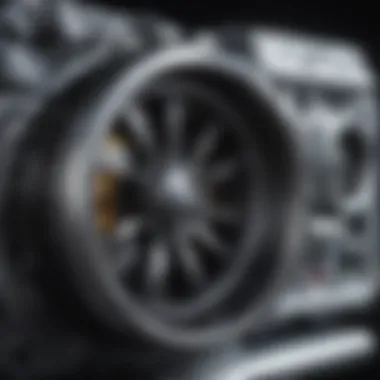Key Elements for a Complete Vehicle Tune-Up


Intro
A vehicle tune-up is not just a routine task; it is an essential aspect of automotive maintenance that ensures the longevity and efficiency of your vehicle. With proper attention, a tune-up can significantly improve engine performance, fuel efficiency, and overall reliability. This comprehensive guide will explore the critical components of a vehicle tune-up, outline the tools and skills necessary for the job, and provide insights to help both automotive enthusiasts and potential vehicle buyers make informed decisions.
A thorough understanding of the components involved in a vehicle tune-up is indispensable. Many factors can contribute to the overall well-being of a vehicle. Ignoring these can lead to diminished performance and higher operational costs. Thus, recognizing and evaluating the essential elements can empower vehicle owners to uphold their automobiles effectively.
As we delve into the specifics, it is crucial to highlight the importance of quality evaluations in product selection. Additionally, expert recommendations will offer clarity on owning the right tools and parts for tuning up a vehicle. Each section will build upon the previous one, creating a cohesive narrative that emphasizes the relevance of maintenance practices within the realm of automotive care.
Understanding the Importance of a Tune-Up
A vehicle tune-up is not merely an automotive chore; it is a holistic approach to maintaining a vehicle’s performance and longevity. Understanding this importance is essential for any vehicle owner or enthusiast. Regular tune-ups ensure that every component of the vehicle operates efficiently. This can directly enhance fuel efficiency and reduce emissions, which is a growing concern for our environment. Therefore, a comprehensive vehicle tune-up should be a deliberate part of vehicle maintenance.
Defining a Full Tune-Up
A full tune-up encompasses several maintenance tasks aimed at optimizing a vehicle's performance. This may include inspecting and replacing spark plugs, air filters, and fuel filters, among other components. Unlike simple oil changes, which focus solely on lubricating the engine, a complete tune-up involves a thorough examination of multiple systems. It lays the groundwork for understanding the vehicle's overall health. Defining a full tune-up requires recognizing this blend of checks, adjustments, and replacements, which work together to maximize performance and efficiency.
Benefits of Regular Tune-Ups
The advantages of regular tune-ups extend beyond immediate performance improvements. Here are some key benefits:
- Increased Fuel Efficiency: Regular maintenance tasks can lead to significant savings on fuel costs.
- Better Performance: A well-tuned vehicle responds more predictably and reliably, contributing to a safer driving experience.
- Extended Vehicle Longevity: Consistent upkeep can prevent costly repairs in the future, thus prolonging the lifespan of the vehicle.
- Emissions Control: A tune-up helps ensure that a vehicle adheres to environmental standards, reducing its carbon footprint.
Regular tune-ups are crucial for both economy and environmental responsibility.
In summary, understanding the importance of a tune-up encompasses recognizing its role in the broader context of vehicle maintenance. It represents a commitment to the vehicle’s functionality and a responsible approach to ownership.
Key Components of a Full Tune-Up
A comprehensive tune-up serves as a blueprint for optimal vehicle performance and longevity. It encompasses various elements that, when addressed, contribute significantly to the smooth operation of a vehicle. Each component in a tune-up interacts with the others, creating a synergy crucial for the overall health of an automobile. By attending to these key components, vehicle owners can enhance fuel efficiency, improve engine performance, and bolster reliability.
Engine Diagnostics
Importance of Computerized Diagnostics
Engine diagnostics are the backbone of modern vehicle maintenance. They utilize computerized systems to assess various functions and components within the engine. This method allows for precise identification of issues that may not be visible otherwise. The key characteristic of computerized diagnostics is the ability to deliver instant data readouts. This can easily point to underlying problems, enabling early intervention.
In this article, the importance of computerized diagnostics is clear. Their ability to quickly assess faults contrasts sharply with traditional diagnostic methods, which often involve guesswork. A unique feature of these systems is their capability to monitor real-time data, providing a comprehensive view of engine health. The advantage lies in the accuracy and efficiency they offer. Moreover, they save time and reduce unnecessary costs.
Common Diagnostic Tools
Common diagnostic tools, such as OBD-II scanners, play an essential role in tune-ups. These tools connect to the vehicle's onboard computer, helping to identify trouble codes. A primary characteristic of these tools is their user-friendliness. Even those who are not highly technical can operate them with basic knowledge. This accessibility makes them a popular choice for vehicle owners—a good starting point for understanding vehicle maintenance.
The unique feature of tools like OBD-II scanners is the ability to clear codes after repairs. This can help reset warning lights and provide immediate feedback on the repair's success. However, disadvantages may include the dependence on vehicle make and model, as some diagnostic tools may perform better with certain brands than others.
Spark Plug Replacement
Types of Spark Plugs
Spark plugs are critical to engine function, igniting the air-fuel mixture for combustion. There are several types of spark plugs available, including copper, platinum, and iridium. The key characteristic of each varies in lifespan and performance. For instance, iridium plugs last longer and provide more efficient combustion, making them a favorable option in this article.


Furthermore, the unique feature of different spark plugs lies in their heat range and gap specification. Selecting the right type directly affects engine performance, horsepower output, and fuel efficiency. Choosing the incorrect type, however, can lead to suboptimal engine performance and potential damage.
Signs of Worn Spark Plugs
Awareness of signs indicating worn spark plugs can save owners from costly repairs. Common symptoms include rough idling, difficulty starting, and engine misfires. The key characteristic of these warning signs is their direct relation to engine performance. For readers, recognizing these issues can trigger timely action, preventing compound problems.
The unique feature of monitoring the performance of spark plugs is the immediate impact they have on fuel efficiency. As they wear, the combustion process becomes inefficient, leading to reduced mileage. Therefore, understanding when to replace plugs can directly translate to long-term savings on fuel costs.
Air Filter Inspection
Functionality of Air Filters
Air filters play a crucial role in maintaining engine performance. They prevent dirt and debris from entering the engine, ensuring a clean air-fuel mix. The key characteristic of effective air filters is their ability to enhance combustion efficiency. Cleaner combustion leads to improved engine performance and reduced emissions, making this component a focus in this article.
A unique feature of high-quality air filters lies within their filtration capabilities. This attribute highlights the advantage of using premium filters which can trap finer particles, further protecting the engine from wear. Conversely, using subpar filters may result in problematic airflow, affecting performance adversely.
When to Replace Air Filters
Determining when to replace air filters hinges on several factors. These include driving conditions, mileage, and manufacturer recommendations. The clear characteristic of this component's lifespan is its variability based on usage. Many drivers underestimate the importance of replacing air filters regularly.
The unique feature concerning air filter inspection is the ease with which it can be done. A quick visual inspection can reveal a lot about a filter's condition. Not replacing it in time can lead to increased fuel consumption and decreased engine power.
Fuel System Cleaning
Symptoms of a Clogged Fuel System
A clogged fuel system can manifest through various symptoms. These may include sluggish acceleration, poor fuel economy, and even engine stalling. The key characteristic of these symptoms is their indicator nature. Recognizing these signs early on can prevent further issues that may lead to expensive repairs in the future.
The unique feature of fuel system monitoring lies in the immediate feedback it provides about engine health. Delaying maintenance can result in long-term damage. Thus, being proactive is advantageous for both performance and wallet.
Methods of Fuel System Cleaning
Methods of cleaning the fuel system can vary from simple fuel additives to more intensive manual cleans. A primary characteristic of popular cleaning methods is their accessibility. Vehicle owners can often perform these tasks with little prior experience. In this article, recognizing methods that suit different needs ensures that vehicle owners make informed decisions.
The unique feature of thorough cleaning is that it not only addresses existing problems but also prevents future ones. Regular cleaning can maintain the health of the system, thus extending the lifespan of fuel injectors and other components.
Oil Change Procedures
Choosing the Right Motor Oil
Selecting the appropriate motor oil is crucial for engine management. Different oils offer varying viscosity and additives that can influence engine performance. Recognizing the right motor oil type for a specific vehicle is paramount. The dominant characteristic here is that using the correct oil can optimize engine efficiency and performance.
A unique feature of quality motor oil is its ability to provide better protection under extreme conditions. On the other hand, using the wrong oil may result in engine wear and failure over time. Hence, understanding specifications outlined in the owner's manual is beneficial.
Oil Change Frequency Guidelines
Guidelines regarding oil change frequency largely depend on driving habits and vehicle requirements. Traditionally, many believed that changing oil every 3,000 miles was sufficient. However, with modern vehicles, this is not always necessary. The primary characteristic of these guidelines is their variability.
Unique here is the understanding that some vehicles can go up to 7,500 miles or more between changes. This knowledge can save time and money, enhancing the owner experience. It's essential for vehicle owners to regularly assess their oil condition to prevent damage to the engine.
Battery Inspection and Maintenance


Signs of Battery Failure
Awareness of battery health is essential. Common signs of battery failure include slow engine cranking, dashboard warning lights, and corrosion on battery terminals. The characteristic of recognizing these signs can alert an owner to impending battery issues, allowing them to take preventive action.
The unique feature of battery inspection lies in its simplicity. A visual check can often suffice to pinpoint problems, thus saving on costly replacements if caught early.
Battery Testing Methods
Understanding different battery testing methods ensures that the vehicle operates reliably. Methods can range from simple load tests to more sophisticated diagnostic scans. The primary characteristic of effective testing is accuracy. The better the testing method, the clearer the understanding of battery health.
A unique feature of battery tests is that they can be conducted both professionally and at home, depending on the owner's knowledge. Disadvantages can include a lack of knowledge leading to improper tests, emphasizing the need for basic understanding of battery maintenance.
In summary, a thorough understanding of the components that contribute to a successful vehicle tune-up can lead to more informed decisions. Recognizing these elements helps ensure optimal performance and longevity.
Tools and Equipment for a Tune-Up
In the realm of vehicle maintenance, having the right tools and equipment is essential. A comprehensive tune-up demands not only knowledge but also the appropriate instruments to ensure effective execution. The right tools enable both professional mechanics and DIY enthusiasts to address the necessary adjustments, replacements, and repairs with efficiency and confidence. Investing in high-quality tools can greatly enhance the overall outcome of a tune-up, while also extending the lifespan of the vehicle.
Essential Hand Tools
Hand tools are fundamental in any garage. They enhance comfort and precision while performing maintenance tasks. Below are three tools that are indispensable for any tune-up.
Wrenches
Wrenches are critical tools in vehicle maintenance. Their primary purpose is to tighten or loosen nuts and bolts, which are commonly found throughout various engine components. A significant characteristic of wrenches is the socket design that offers a snug fit around fasteners, ensuring maximum torque without damage. Using a wrench reduces the risk of stripping bolts, contributing to a smoother maintenance experience. However, those not familiar with specifications may encounter difficulty selecting the proper size wrench, which can complicate the process.
Screwdrivers
Screwdrivers are versatile tools that come in various shapes and sizes, designed to turn screws. A key aspect of screwdrivers is the interchangeable tips, which allow one tool to work with different screw types. This feature promotes efficiency during tune-ups, as accessing various compartments often requires the use of multiple screws. On the negative side, screwdrivers can lose their effectiveness over time if tips become worn. It’s essential to regularly replace them to maintain optimal performance.
Pliers
Pliers serve multiple functions in vehicle maintenance, from gripping to cutting wires. They provide a strong grip on small components that may be hard to hold with bare hands. The key characteristic of pliers is their ability to exert a significant amount of pressure, making them useful in various situations. However, inexperienced users may risk damaging delicate parts if not used carefully. Hence, it’s vital to understand the right type of pliers for specific tasks.
Diagnostic Equipment
Diagnostic equipment is crucial for identifying issues within a vehicle. Modern vehicles are equipped with sophisticated computer systems that require specialized tools for troubleshooting and repairs.
OBD-II Scanners
OBD-II scanners serve as a diagnostic tool to read error codes generated by a vehicle's onboard computer. Their primary function is to identify malfunctions in engine performance, emissions, and other systems. This equipment is beneficial for anyone seeking to maintain vehicle health, as it streamlines the diagnosis process. However, while many scanners are user-friendly, some advanced models require a greater understanding of automotive diagnostics, which may be a drawback for casual users.
Multimeters
Multimeters are essential for diagnosing electrical issues. They measure voltage, current, and resistance, providing critical information that can help pinpoint electrical failures within a vehicle. The versatility of a multimeter makes it an invaluable tool for both professionals and DIY enthusiasts. Despite its usefulness, the learning curve associated with interpreting multimeter readings can be challenging for some, potentially resulting in misdiagnosis if not handled correctly.
Maintenance Supplies
Maintenance supplies contribute significantly to the overall performance and longevity of a vehicle. Having the right supplies ensures that routine tasks can be performed effectively.
Oil Filters


Oil filters play a crucial role in maintaining engine health by removing contaminants from motor oil. A key aspect of quality oil filters is their ability to trap harmful particles effectively while allowing oil to flow smoothly. Using a reputable oil filter can enhance engine performance and efficiency. However, it’s essential to select the correct filter type, as improper selection can lead to inadequate filtration and, ultimately, engine damage.
Fuel Injector Cleaners
Fuel injector cleaners are chemical solutions that help maintain the cleanliness of fuel injectors. They provide a convenient method for ensuring optimal fuel flow and combustion efficiency. The effectiveness of fuel injector cleaners has made them a popular choice among automotive enthusiasts. However, overuse can lead to a buildup of residues instead of removing them, so proper application is necessary to avoid potential negative effects.
Investing in the right tools and equipment not only enhances the procedure of vehicle maintenance but also ensures that it is conducted correctly, protecting against costly mistakes.
Professional vs. DIY Tune-Ups
The debate between professional and DIY tune-ups is significant in vehicle maintenance. Each option offers distinct advantages and disadvantages. Choosing between the two is a crucial decision that affects vehicle longevity and performance. Understanding when to seek professional help or when to undertake the task yourself can result in better outcomes for your vehicle.
When to Consult a Professional
Complex Repairs
Complex repairs often entail significant issues beyond basic tune-up tasks. These repairs may involve intricate components such as the engine, transmission, or advanced electronic systems. They demand a high level of expertise and often specific tools that can be expensive or inaccessible for the average car owner.
When faced with symptoms like strange noises or erratic performance, it is wise to consult a qualified mechanic. They can accurately diagnose and rectify the problem using specialized equipment. This choice not only improves vehicle reliability but also prevents further damage that could occur from misdiagnosis or improper repairs.
"Complex repairs require advanced knowledge and tools, making professionals the safer choice for such tasks."
Lack of Tools or Knowledge
If a person lacks the necessary tools or automotive knowledge, it may be better to seek professional assistance. Basic tune-up tasks can be manageable, but some jobs require specific equipment or expertise that a typical DIYer may not possess. For example, activities like adjusting timing belts or addressing fuel system issues can be particularly challenging without proper training.
Attempting these jobs without adequate knowledge could lead to complications, safety concerns, or expensive mistakes. Hiring professionals ensures safe, efficient service while protecting the value of the vehicle.
Advantages of DIY Maintenance
Cost Savings
One of the most appealing aspects of DIY maintenance is cost savings. Labor costs at professional shops can be substantial. By performing basic tunes-ups and maintenance tasks themselves, car owners can keep expenses down.
However, one must factor in the costs of tools and any replacement parts. If you are skilled and have handy tools, these costs can be minimized, making DIY an economical choice for maintaining your vehicle.
Understanding Your Vehicle
Engaging in DIY maintenance cultivates a deeper understanding of one’s vehicle. This knowledge is invaluable. Familiarity with how various components work helps in recognizing potential issues early. Moreover, performing your own upkeep can enhance the overall relationship between the car owner and their vehicle.
By grasping how your car functions, you can make informed decisions about further repairs and maintenance, ultimately leading to longer vehicle life and better performance.
End on the Necessity of Full Tune-Ups
A comprehensive vehicle tune-up is not merely a luxury; it is a necessity for those who value their automobiles. Regular maintenance contributes to the optimal performance of vehicles. It improves fuel efficiency, enhances engine function, and prevents costly repairs down the line. In a world where the cost of vehicle ownership can escalate quickly, understanding the importance of tune-ups can lead to significant savings in both time and money.
Many vehicle owners may underestimate the role that a tune-up plays. They might feel that if their car starts and drives, then all is well. However, neglecting to address small issues can spiral into larger problems. Therefore, acknowledging the necessity of a full tune-up becomes essential. It acts as a proactive measure rather than one that reacts to failures.
Long-term Benefits of Regular Maintenance
Regular maintenance is an investment that repays the vehicle owner many times over. Here are some key long-term benefits:
- Increased Longevity: Regular tune-ups can help extend the life of your vehicle. By addressing issues early, parts are less likely to degrade prematurely.
- Improved Safety: A well-maintained vehicle is safer to drive. Issues such as worn brakes or poor tire performance can be detected and fixed during a tune-up.
- Better Resale Value: Maintaining a vehicle can enhance its resale value. Potential buyers are more likely to purchase a car that has been consistently cared for.
- Environmental Responsibility: A tune-up can lead to better fuel economy, which in turn reduces emissions. This is an important consideration for eco-conscious individuals.
"An ounce of prevention is worth a pound of cure."
Thus, making tune-ups a regular part of vehicle care is essential for optimal performance and peace of mind.



